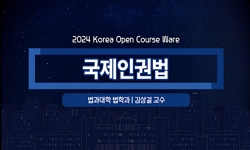This paper has two main purposes. One is to make it clear that the concept of human dignity is treated indirectly and ambiguously due to the absence of an ethical approach in the section ‘Guarantee of Human Rights and the Constitution’ unit of <...
http://chineseinput.net/에서 pinyin(병음)방식으로 중국어를 변환할 수 있습니다.
변환된 중국어를 복사하여 사용하시면 됩니다.
- 中文 을 입력하시려면 zhongwen을 입력하시고 space를누르시면됩니다.
- 北京 을 입력하시려면 beijing을 입력하시고 space를 누르시면 됩니다.

윤리학적 관점에서 <통합사회>의 인간 존엄성 개념 재고찰 - 칸트와 누스바움을 중심으로 - = Reconsidering Human Dignity in <Integrated Society> from the Ethical Perspective: Focusing on Kant and Nussbaum
한글로보기https://www.riss.kr/link?id=A108279852
-
저자
윤준식 (서울대학교)
- 발행기관
- 학술지명
- 권호사항
-
발행연도
2022
-
작성언어
Korean
-
주제어
통합사회 ; 인간 존엄성 ; 칸트 ; 누스바움 ; 인권 ; 윤리학적 접근 ; Integrated Society ; Human Dignity ; Kant ; Nussbaum ; Human Rights ; Ethical Perspective
-
등재정보
KCI등재
-
자료형태
학술저널
- 발행기관 URL
-
수록면
69-97(29쪽)
- DOI식별코드
- 제공처
-
0
상세조회 -
0
다운로드
부가정보
다국어 초록 (Multilingual Abstract)
Although the idea of human dignity itself has intrinsic uncertainty, more cohesive forms of explanation are available from the curriculum’s standpoint about human dignity. As a basic work for the developmental reconstruction of the ‘Guarantee of Human Rights and the Constitution’, this article extends the traditional paradigm of differentiating between the initial and the realized dignity through Kant’s ethical thoughts, which is the core justification base of the concept of human dignity. And this is further embodied through Nussbaum’s Capabilities Approach, based on the vulnerability of the human body, which emphasizes the actualization of human dignity in daily life. In light of the foregoing, the last chapter suggests the content elements of the concept of human dignity and explores how to restructure the ‘Guarantee of Human Rights and Constitution’.
This paper has two main purposes. One is to make it clear that the concept of human dignity is treated indirectly and ambiguously due to the absence of an ethical approach in the section ‘Guarantee of Human Rights and the Constitution’ unit of <Integrated Society>. The other is to propose content elements of the concept of human dignity by combining Kant and Nussbaum’s ethical thoughts that might be used in the developmental reconstruction of the ‘Guarantee of Human Rights and the Constitution’.
Although the idea of human dignity itself has intrinsic uncertainty, more cohesive forms of explanation are available from the curriculum’s standpoint about human dignity. As a basic work for the developmental reconstruction of the ‘Guarantee of Human Rights and the Constitution’, this article extends the traditional paradigm of differentiating between the initial and the realized dignity through Kant’s ethical thoughts, which is the core justification base of the concept of human dignity. And this is further embodied through Nussbaum’s Capabilities Approach, based on the vulnerability of the human body, which emphasizes the actualization of human dignity in daily life. In light of the foregoing, the last chapter suggests the content elements of the concept of human dignity and explores how to restructure the ‘Guarantee of Human Rights and Constitution’.
동일학술지(권/호) 다른 논문
-
2022 도덕과 교육과정에서 고등학교 선택과목 ‘생활과 윤리’ 과목 명칭 유지에 대한 교사 요구 분석
- 한국윤리학회
- 김국현
- 2022
- KCI등재
-
- 한국윤리학회
- 추병완
- 2022
- KCI등재
-
- 한국윤리학회
- 김현수
- 2022
- KCI등재
-
- 한국윤리학회
- 변종헌
- 2022
- KCI등재




 KCI
KCI KISS
KISS






